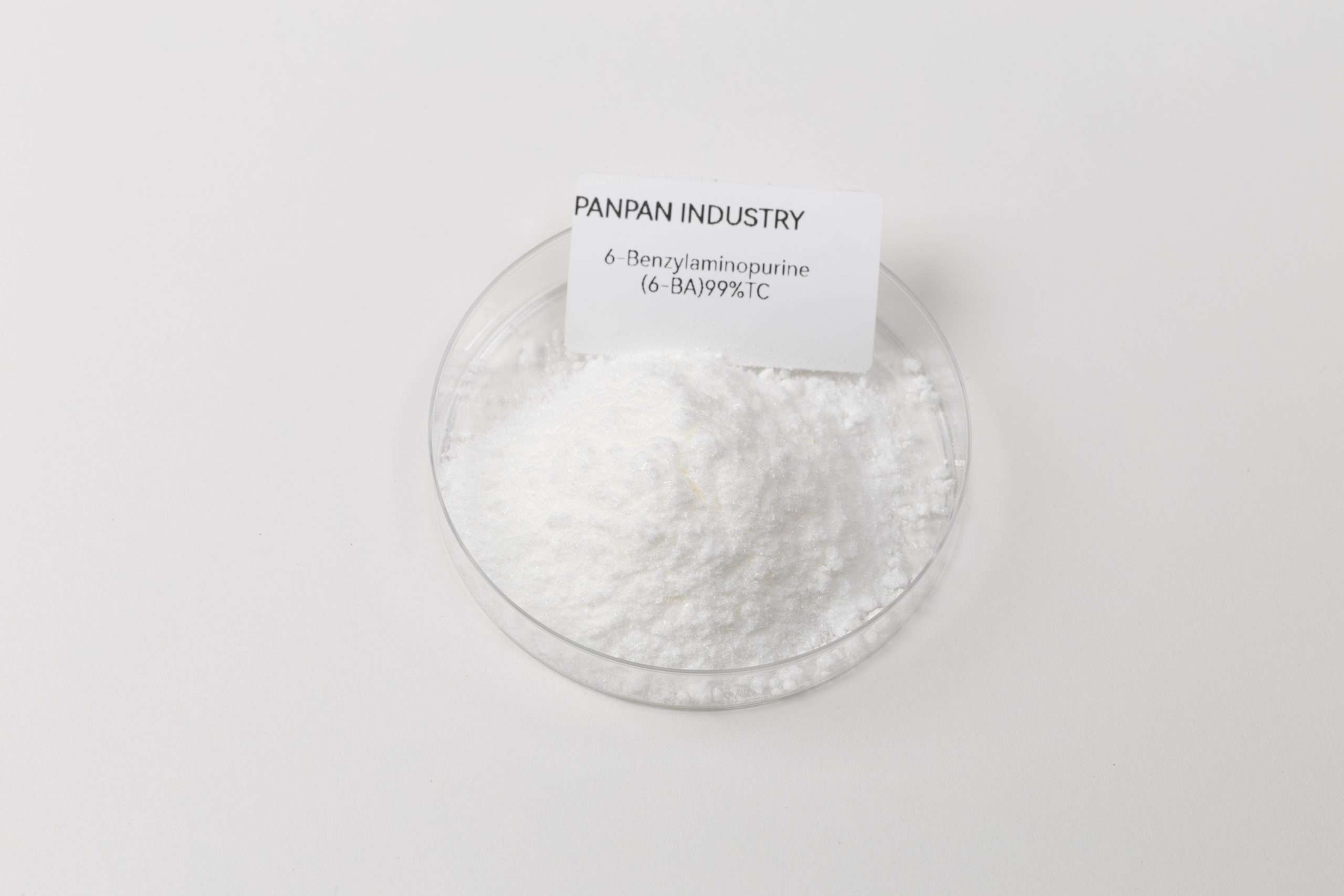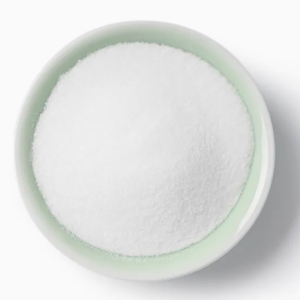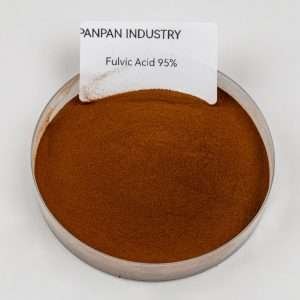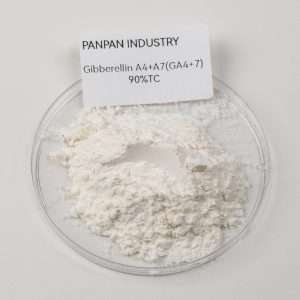【1】Chinese common name Benzylaminopurine
【2】English common name 6-benzylamino purine, 6-BA
【3】Commodity name
【4】Chemical name 6-(N-benzyl)aminoadenine
【5】CAS No. 1214-39-7
【6】Molecular formula C12H11N5
【7】Relative molecular mass 225.25
【8】Physical and chemical properties
White micro-needle crystal or powder, melting point 228~230℃. Insoluble in water, insoluble in most organic solvents, soluble in dimethylformamide, dimethyl sulfoxide, and soluble in acid and alkali. Stable under acid, alkali and neutral conditions, stable to light and heat.
【9】 Toxicity Low toxicity
【10】Main dosage forms: 98% benzylaminopurine original drug, 1% benzylaminopurine soluble powder, 2% benzylaminopurine solution, 5% benzylaminopurine water
【11】Features
Benzylaminopurine is a synthetic cytokinin plant growth regulator, absorbed by germinated seeds, roots, shoots and leaves, and has little mobility into the body. Benzylaminopurine has a variety of physiological functions: promote cell division, promote undifferentiated tissue differentiation, promote cell enlargement and growth, promote seed germination, induce dormant bud growth, inhibit the decomposition of chlorophyll, delay aging, and promote or inhibit enzyme activity , affects the growth of stems, leaves and roots, breaks apical dominance, promotes lateral bud growth, and promotes flower bud formation and flowering.
【12】Applied technology
1.Promote seed germination and improve seedling resistance to stress
Wheat
Soaking seeds with 15-20mg/L benzylaminopurine for 24h, or spraying 2.5-25mg/L liquid on the surface of wheat at 2 leaves and 1 heart stage can improve the germination rate and germination potential, and can improve the resistance of seedlings to low temperature and drought. It can alleviate the damage of heavy metal stress on seedlings, but its effect varies with wheat varieties.
Rice
Treated with 20mg/L benzylaminopurine solution for 48h, the germination rate of seeds was increased by 5% compared with the control (water treatment), and the germination was fast and tidy; it was beneficial to improve the quality of seedlings and enhance the resistance to stress; The effect is 48%, and the rate of seedling formation can be increased by 21.8%, thereby increasing the yield of early rice in the later stage.
Corn
Seed soaking with 2.25mg/L benzylaminopurine for 18h can improve the germination rate, the seedlings are robust, the roots are strong, the leaf color is deepened, the plant height is increased, and the dry matter accumulation is more. The foliar spraying of 2.25mg/L benzylaminopurine liquid at 3 leaves and 1 heart stage can increase the photosynthetic rate, chlorophyll content, photosynthetic carboxylase and cytoprotective enzyme activities of maize seedlings under water stress conditions, reduce stomatal resistance and The content of malondialdehyde can reduce the damage of reactive oxygen species to the membrane under water stress, and enhance the drought resistance of maize seedlings.
Potato
Immersion of tubers with 10-20mg/L benzylaminopurine of Panpan Industry for 6-12 hours can achieve the effect of quick emergence and strong seedlings.
Cotton
Seed soaking with 1.5~2mg/L benzylaminopurine for 6~7h can promote the germination of aged cotton seeds to a certain extent, and at the same time protect the cell membrane system to different degrees.
Melon
Soaking seeds with 20mg/L benzylaminopurine for 6 hours can improve the germination rate and rapid emergence of seedlings; at the seedling stage, foliar spray treatment with 30-50mg/L benzylaminopurine can affect the growth of melon roots and inhibit the stem thickness and thickness of the seedlings. The root is long, but it can enhance the peroxidase (POD) activity and improve the stress resistance of seedlings.
Tomato
Seed soaking with 10mg/L benzylaminopurine of Panpan Industry for 6h can promote the germination of tomato seeds, significantly improve the seed vigor, and have obvious effects on the early growth such as the elongation of the radicle and the increase of the fresh weight of the seedlings.
chili
Spraying pepper seedlings with 20-25 mg/L benzylaminopurine after transplanting can promote the normal growth of pepper seedlings under high temperature stress.
Cucumber
Seed soaking with 5mg/L benzylaminopurine for 24h can delay the decrease of root activity and the increase of root conductivity in the roots of cucumber seedlings under flooding stress, and can keep cucumbers under flooding stress at a high level for a long time. Protects enzyme and alcohol dehydrogenase (ADH) activities, thereby improving cucumber resistance to flooding stress.
Bupleurum
Soaking seeds with 50~100mg/L benzylaminopurine liquid for 24h can improve the germination rate of Bupleurum chinensis.
Gladiolus
Spraying bulbs directly with 1000mg/L liquid or soaking tubers with 200mg/L liquid for 4h before sowing or soaking with 10-50mg/L liquid for 12-24h can achieve the effect of breaking dormancy and promoting germination.
Fragrance
Using 10~40mg/L benzylaminopurine to soak the bulbs for 12~24h before sowing can achieve the effect of breaking dormancy and promoting germination.
Ma Zhan Acacia
Soaking seeds with 100mg/L benzylaminopurine liquid for 10min can improve the germination rate of Acacia mazhana.
Dendrobium candidum
The foliar spraying of Dendrobium officinale seedlings with 2 mg/L benzylaminopurine can improve the synthesis and accumulation of photosynthetic pigments and soluble sugars, and alleviate the damage to plants caused by salt stress.
2.Improve photosynthesis and increase production
Wheat
Spraying with 10-30mg/L benzylaminopurine of Panpan Industry during the grain filling period can improve the photosynthesis of wheat, promote the accumulation of dry matter and its distribution to the grain, and can slow down the adverse effects of waterlogging on yield formation, promote the Stable and increased production.
Rice
At the head-starting stage of rice, foliar spraying with 40 mg/L benzylaminopurine liquid can lead to full heading and grain filling 3 days earlier than water spraying, increase the number of effective panicles and grains per panicle, increase the seed setting rate by 4.5%, and increase the 1000-grain weight by 0.7%. g, and can reduce the impact of autumn wind and rain on the flowering and pollination of rice, and the effect of increasing yield is remarkable.
Corn
In the corn filling stage, 10mg/L benzylaminopurine liquid spray or root irrigation treatment, combined with an appropriate amount of nitrogen fertilizer, can significantly improve the activity of enzymes related to nitrogen metabolism and nitrogen absorption efficiency in corn leaves after flowering, which is conducive to the absorption of nitrogen in plants. Accumulation, promoting the transport of nitrogen elements in various vegetative organs to the grain, increasing the dry matter accumulation per plant after corn blooms, thereby increasing the corn grain yield.
Soybean
The foliar spraying of 200 mg/L benzylaminopurine at the early flowering stage was beneficial to the accumulation of photosynthetic products in leaves and increased yield. At the same time, it also increases the protein content in soybean grains, affects the composition and content of fatty acids in the grains, and improves the quality of soybeans.
Chinese cabbage
Using 20-40mg/L benzylaminopurine in the seedling stage, cluster stage and rosette stage, spraying once every 10-15d, a total of 2-3 times, can increase chlorophyll, improve photosynthesis, accelerate the growth and development of crops, improve Yield.
Rapeseed
Before and after flowering, whole plant spraying with 20 mg/L benzylaminopurine can significantly increase the number of siliques per plant, improve the fruiting characters of the main inflorescence, and increase the silique grain-to-shell ratio, thereby effectively increasing the yield of rapeseed.
Melon
During the flowering period, the whole plant spraying of 30-40mg/L benzylaminopurine from Panpan Industry can improve the light energy utilization efficiency of leaves at the fruit-setting nodes of the thick-skinned muskmelon, optimize the light energy distribution ratio, improve the photosynthetic performance of leaves, and enhance the Antioxidant enzyme activity can relieve peroxidative damage of membrane, improve nitrogen reduction and assimilation ability, and improve leaf physiological function, which is beneficial to the improvement of fruit weight and intrinsic quality.
Red bean sprouts
Soaking seeds with 300mg/L benzylaminopurine liquid for 20h, and spraying the same concentration once or twice in the seedling stage, can promote the growth of adzuki bean sprouts and increase the yield.
3.Regulate flower and fruit development, promote fruit setting and fruit expansion
Watermelon, Cantaloupe
Applying 100mg/L benzylaminopurine to the stalk on the day of flowering can achieve the effect of promoting fruit set.
Pumpkin, Zucchini
Applying 100mg/L benzylaminopurine to the stalk from 1 day before flowering to the day can achieve the effect of promoting fruit setting.
Cucumber
Using 60mg/L benzylaminopurine to spray flowers and young fruits when the female flowers of cucumber are fully opened can promote fruit setting and growth of young fruits, increase the number of commercial fruits, and increase yield.
Tomato
Using 100mg/L benzylaminopurine to soak or spray the inflorescence (add 20~30mg/L gibberellic acid) during flowering can achieve the effect of promoting fruit setting and air-raid fruit.
Dates
From 70% to 80% of flowering to the period of rapid fruit expansion, spray the fruit with 20-28.5mg/L liquid evenly. , Continuous application of 2 to 3 times can promote flower bud differentiation, accelerate growth and development, strengthen plants, strengthen fruit and increase yield.
Grape
Using Panpan Industry’s 100mg/L benzylaminopurine to soak the inflorescence during flowering can achieve the effect of promoting fruit setting and forming seedless grapes; after flowering, use 50~100mg/L benzylaminopurine with 20~30mg/L gibberellic acid, It can promote fruit expansion and improve yield and quality.
Tangerine
At the beginning of blooming (before the first physiological fruit drop), the young fruit stage (before the second physiological fruit drop), and before the fruit expands, spray 33.3-50 mg/L benzylaminopurine liquid once each, focusing on the flowers and fruits , can achieve the effect of promoting fruit setting and increasing yield.
4.Anti-aging, preservation
Cabbage, Spinach
After harvesting, spraying or soaking leaves with 30mg/L benzylaminopurine can prolong the storage period.
rape cauliflower
Spraying or impregnating leaves with 10-15mg/L benzylaminopurine during harvest can more effectively slow down post-harvest leaf yellowing and sensory quality decline, reduce its quality loss, and significantly inhibit respiration intensity, chlorophyll decomposition and dialdehyde. Formation, maintaining its high total phenolic content and the ability to scavenge DPPH free radicals, can achieve the effect of prolonging the storage period.
sweet pepper
Pre-harvest or post-harvest dipping with 10-20mg/L benzylaminopurine sprayed on the foliage can significantly inhibit the respiration during storage, delay the arrival of the peak of respiration, and achieve the effect of prolonging the storage period.
radish, lettuce
When harvesting, 5-10mg/L benzylaminopurine is sprayed on the foliage or soaked after harvesting, which can significantly inhibit the respiration during storage, delay the arrival of the peak of respiration, and achieve the effect of prolonging the storage period.
melons
After harvesting, soaking with 10~30mg/L benzylaminopurine for 5min can achieve the anti-storage effect.
date
Pre-harvest spraying of 15 mg/L benzylaminopurine can inhibit the decline of peroxidase and catalase activities in jujube fruit, reduce the accumulation of malondialdehyde and the relative conductivity of pulp tissue, thereby inhibiting the ripening and senescence of jujube fruit .
Grape
Spraying 20mg/L benzylaminopurine 3 to 4 times in the middle and late stage of grape growth can increase the chlorophyll content of grape leaves and delay leaf senescence for about 15 days.
Toon
After harvesting, soaking with 100mg/L benzylaminopurine for 10s and refrigerating it can delay the degradation of chlorophyll and prolong the storage period.
Peach
The fruit sprayed with 500mg/L benzylaminopurine liquid can improve the defense ability of fruit against peach brown rot by inducing resistance, maintaining cell membrane integrity, delaying fruit senescence, and significantly reducing the incidence of peach brown rot.
litchi
After harvesting, soaking with 100mg/L benzylaminopurine for 1-3min can prolong the storage period.
Lily, Chinese rose, peony, chrysanthemum, carnation and other flowers
In the middle and late stages of flower growth, spraying 25-50mg/L benzylaminopurine or soaking cut flowers with 1.5-2.5mg/L liquid can significantly prolong the lifespan of cut flowers and delay senescence.
5.Break the apical dominance and promote the growth of lateral buds
apple
In the long-term growth of new shoots, spraying the whole plant with 150-600 mg/L benzylaminopurine once can achieve the effect of promoting the growth of lateral buds.
cuckoo
During the growth period, the whole plant was sprayed with 250-500 mg/L benzylaminopurine twice (1d interval) to promote the growth of lateral buds.
Toon
Spraying the whole plant with 50-75mg/L benzylaminopurine once during the growth period can induce the germination of terminal buds, cause the surge of lateral buds, inhibit the apical dominance of terminal buds, accelerate the growth rate of Toona sinensis buds, make the buds stronger, and significantly increase the yield per plant.
cotton
In the normal topping period of cotton, use 90mg/L liquid medicine for the first time, spray evenly, and directly spray the top center part. The second time, 14 to 20 days after the first application, spray the top center and edge center with the same concentration evenly, which can replace manual topping, and has a good adjustment effect on plant height, number of fruit branches and cotton bolls. The effect of increasing yield is significant, but it may increase the micronaire value and have a certain impact on cotton quality.
6.Flower thinning and fruit thinning
apple
Spray once with 50-200mg/L benzylaminopurine at full bloom, 3 days after full bloom, 15 days after full bloom, and 25 days after full bloom, which can effectively remove excess flowers and fruits and adjust the appropriate fruit size. (Note: Compared with naphthalene acetic acid, benzylaminopurine has a slightly worse removal effect, but the single fruit weight is slightly higher than naphthalene acetic acid. However, when applied under rainy climate conditions, it will promote axillary germination. Buds also have fruit thinning effect, inducing auxiliary production buds, affecting tree shape.)
7.Promotes differentiation of undifferentiated tissues
Rose
Use 0.5%-1.0% benzylaminopurine ointment to make wounds on the upper and lower parts of the near ground buds, and apply the ointment to increase the number of basal branched cut flowers.
apple, pear
Applying 600-800 mg/L benzylaminopurine to dormant buds can promote the extraction of strong lateral branches of apples and pears.
【14】Notes
① Benzylaminopurine is used for seed soaking treatment, low concentration promotes seed germination, and high concentration inhibits; Benzylaminopurine is used for green leaf preservation, which is effective when used alone, and better when mixed with gibberellic acid.
② Benzylaminopurine is used as a fruit thinning agent, and the concentration used is related to the variety, period, temperature and humidity.
③This product has poor conductivity, so be careful when using it.
Related products
FAQ
We are based in Henan, China, start from 2021,sell to South America(31.00%),North America(25.00%),Western Europe(15.00%),Central America(8.00%),Oceania(5.00%),Eastern Asia(5.00%),Eastern Europe(4.00%),Southeast Asia(3.00%),South Asia(2.00%),Africa(00.00%),Mid East(00.00%). There are total about 5-10 people in our office.
Always a pre-production sample before mass production;
Always final Inspection before shipment;
Gibberellin GA3,Cytokinin,Rooting Hormone,Fruit Coloring,Plant Growth Inhibitor
1. Professional supplier of Gibberellic acid,IBA, 6-Benzylaminopurine, CPPU,abscisic acid and other plant growth regulators 2. 12 years exporting experience with customers all over the world 3. Product has been approved by SGS
Accepted Delivery Terms: FOB,CFR,CIF,EXW,FAS,CIP,FCA,CPT,DEQ,DDP,DDU,Express Delivery,DAF,DES;
Accepted Payment Currency:USD,EUR,JPY,CAD,AUD,HKD,GBP,CNY,CHF;
Accepted Payment Type: L/C,D/P D/A,MoneyGram,Credit Card,PayPal,Western Union,Cash,Escrow;
Language Spoken:English,Chinese,Spanish






